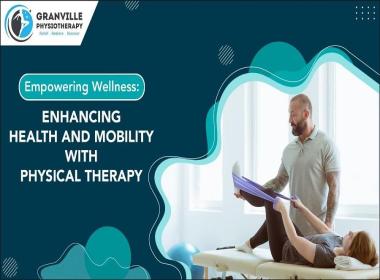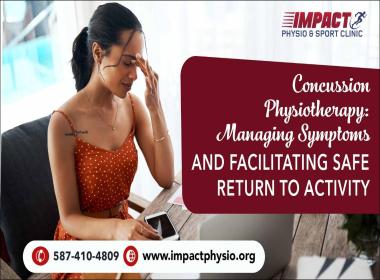Whiplash, a common injury following motor vehicle accidents or any impact that causes a sudden jerk of the head, can result in severe neck pain and other associated symptoms such as headaches, stiffness, and reduced range of motion. It can significantly affect an individual's quality of life and daily functioning. Thankfully, effective strategies for managing and overcoming whiplash-associated disorders are available through specialized whiplash physiotherapy Edmonton. At Vertex Physiotherapy in Edmonton, they provide dedicated and comprehensive care to individuals suffering from whiplash-associated neck pain.
Understanding Whiplash and Its Impact
Whiplash injuries result from a rapid back-and-forth motion of the neck, which is similar to the cracking of a whip, hence the term 'whiplash.' This sudden motion can cause injuries to the soft tissues of the neck, including ligaments, nerves, and muscles, leading to a variety of symptoms. Neck pain, often severe, is the most common symptom, but others can include headaches, dizziness, fatigue, and even cognitive or emotional symptoms.
Initial Assessment and Treatment
The first step in managing whiplash-associated neck pain is a comprehensive assessment to understand the extent of the injury, identify specific pain sources, and determine the right treatment approach. The assessment at Vertex Physiotherapy includes a detailed history, physical examination, and, if necessary, appropriate imaging studies.
Following the assessment, the initial treatment aims to reduce pain and inflammation, restore neck movement, and prevent further injury. This could involve a combination of pain-relieving techniques such as manual therapy, gentle exercises, and advice on pain management strategies and activity modifications.
Rehabilitation and Recovery
As the acute phase of the injury resolves, the focus of whiplash and neck pain physiotherapy in Edmonton’s Vertex Physiotherapy shifts to rehabilitation and recovery. This includes progressively challenging exercises to restore strength, flexibility, and normal neck movement and addressing any residual symptoms such as headaches or dizziness.
Vertex Physiotherapy in Edmonton offers a customized rehabilitation program based on the individual's specific needs and goals. Their experienced physiotherapists ensure that every patient receives personal attention and care, leading to effective recovery and a return to normal activities.
Preventing Chronic Whiplash Disorders
A key goal of whiplash physiotherapy is to prevent the development of chronic whiplash disorders, a condition where symptoms persist for several months or even years after the injury. This involves early and effective treatment, patient education about the nature of the injury and expected recovery, encouragement of normal activity, and addressing any psychological factors that might influence recovery.
Neck Stability and Conditioning
One significant aspect of Vertex Physiotherapy’s whiplash physiotherapy in Edmonton is its emphasis on enhancing neck stability. This is achieved through exercises that focus on strengthening the deep neck muscles. These muscles are crucial in maintaining appropriate neck posture and movement. Strengthening these muscles can help alleviate whiplash-associated neck pain and prevent the recurrence of symptoms.
In addition, conditioning exercises are used to improve the overall endurance of the neck muscles. Increased muscle endurance can reduce the risk of re-injury and help individuals return to their regular activities without fear of triggering neck pain. These exercises are tailored to the individual's capabilities and progressively intensify as their condition improves.
Patient Education and Self-Management Strategies
Patient education is another important aspect of whiplash physiotherapy. At Vertex Physiotherapy, patients are educated about their injuries, the recovery process, and the importance of active participation in their rehabilitation.
Patients are taught self-management strategies such as appropriate neck postures to adopt, especially during activities such as computer work or driving, which can strain the neck. They are also trained in performing specific exercises at home to augment their in-clinic treatment, contributing significantly to a faster and more effective recovery.
Integration of Adjunct Therapies
To enhance the effectiveness of whiplash physiotherapy, Vertex Physiotherapy may incorporate adjunct therapies such as massage, acupuncture, or dry needling, based on individual needs. These therapies can provide additional pain relief, promote muscle relaxation, and improve blood flow to the affected areas, accelerating the healing process.
Ergonomic Advice and Workplace Modifications
In addition to targeted physiotherapy, the team at Vertex Physiotherapy offers advice on ergonomic modifications in the workplace. This is particularly beneficial for patients whose work involves prolonged sitting or computer use. Proper workplace ergonomics can minimize stress on the neck and prevent aggravation of whiplash symptoms, promoting faster recovery.
Continued Care and Follow-Up
Recovery from a whiplash injury is a process, and continued care is crucial to ensure a complete recovery. After the completion of the initial treatment plan, Vertex Physiotherapy offers follow-up care. This includes periodic assessments to monitor progress and promptly identify and address any emerging or persisting issues. Follow-up care can be particularly beneficial for patients with severe injuries or those who have developed chronic whiplash disorders.
Conclusion
Whiplash injuries can be a significant source of neck pain and discomfort, impacting individuals' daily lives and well-being. However, full recovery is entirely possible with the comprehensive treatment approach, which includes neck stability and conditioning exercises, patient education, integration of adjunct therapies, and continued care. Vertex Physiotherapy Edmonton is committed to providing comprehensive, evidence-based care for individuals with whiplash-associated neck pain, helping them regain their health and quality of life.
Also read about:
Concussion Physiotherapy Managing Symptoms and Facilitating Safe Return to Activity
Establishing a Healthy Home The Importance of Routine Duct Cleaning
Knee Pain Physiotherapy Finding Relief and Mobility







